Our new Book Review Team has expanded with the arrival of Emilie Thévenoz (Thank you Emilie for joining us!), which means we are now able to publish more calls for reviews this year. The second call for 2020 – after the one on climate change and the environment we published in January – is about law, technology and bureaucracy. From algorithms in Uberland to law and spirits in Ghana and the International Criminal Tribunal for Rwanda, this call should be a delight for political and legal anthropologists, and socio-legal scholars more broadly. Enjoy!
How to Proceed:
As we receive many requests for reviews, please send an email to reviews@allegralaboratory.net indicating which book you would like to review, your postal address, and 2-3 sentences explaining why you should be reviewing the book. Please explain how the book relates to your own research or interests. We will get back to you once we have selected the reviewers.
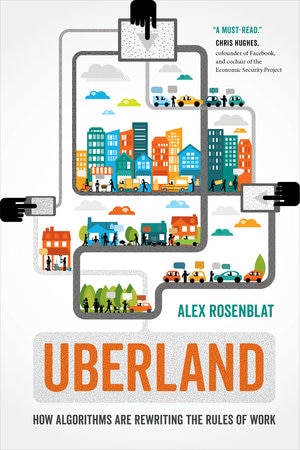 Alex Rosenblat. 2019.Uberland: How Algorithms are Rewriting the Rules of Work. California University Press
Alex Rosenblat. 2019.Uberland: How Algorithms are Rewriting the Rules of Work. California University Press
Silicon Valley technology is transforming the way we work, and Uber is leading the charge. An American startup that promised to deliver entrepreneurship for the masses through its technology, Uber instead built a new template for employment using algorithms and Internet platforms. Upending our understanding of work in the digital age, Uberland paints a future where any of us might be managed by a faceless boss.
The neutral language of technology masks the powerful influence algorithms have across the New Economy. Uberland chronicles the stories of drivers in more than twenty-five cities in the United States and Canada over four years, shedding light on their working conditions and providing a window into how they feel behind the wheel. The book also explores Uber’s outsized influence around the world: the billion-dollar company is now influencing everything from debates about sexual harassment and transportation regulations to racial equality campaigns and labor rights initiatives.
Based on award-winning technology ethnographer Alex Rosenblat’s firsthand experience of riding over 5,000 miles with Uber drivers, daily visits to online forums, and face-to-face discussions with senior Uber employees, Uberland goes beyond the headlines to reveal the complicated politics of popular technologies that are manipulating both workers and consumers.
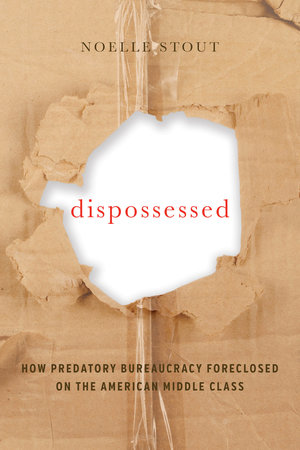 Noelle Stout. 2019. Dispossessed: How Predatory Bureaucracy Foreclosed on the American Middle Class. University of California Press.
Noelle Stout. 2019. Dispossessed: How Predatory Bureaucracy Foreclosed on the American Middle Class. University of California Press.
In the aftermath of the 2008 financial crisis, more than 14 million U.S. homeowners filed for foreclosure. Focusing on the hard-hit Sacramento Valley, Noelle Stout uncovers the predacious bureaucracy that organized the largest bank seizure of residential homes in U.S. history. Stout reveals the failure of Wall Street banks’ mortgage assistance programs—backed by over $300 billion of federal funds—to deliver on the promise of relief. Unlike the programs of the Great Depression, in which the government took on the toxic mortgage debt of Americans, corporate lenders and loan servicers ultimately denied over 70 percent of homeowner applications. In the voices of bank employees and homeowners, Stout unveils how call center representatives felt about denying appeals and shares the fears of families living on the brink of eviction. Stout discloses the impacts of rising inequality on homeowners—from whites who felt their middle-class life unraveling to communities of color who experienced a more precipitous and dire decline. Trapped in a Kafkaesque maze of mortgage assistance, borrowers began to view debt refusal as a moral response to lenders, as seemingly mundane bureaucratic dramas came to redefine the meaning of debt and dispossession.
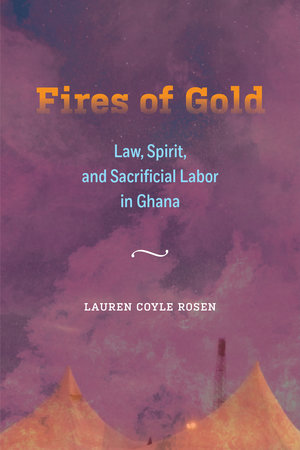 Lauren Coyle Rosen. 2020. Fires of Gold: Law, Spirit, and Sacrificial Labor in Ghana. University of California Press
Lauren Coyle Rosen. 2020. Fires of Gold: Law, Spirit, and Sacrificial Labor in Ghana. University of California Press
Fires of Gold is a powerful ethnography of the often shrouded cultural, legal, political, and spiritual forces governing the gold mining industry in Ghana, one of Africa’s most celebrated democracies. Lauren Coyle Rosen argues that significant sources of power have arisen outside of the formal legal system to police, adjudicate, and navigate conflict in this theater of violence, destruction, and rebirth. These authorities, or shadow sovereigns, include the transnational mining company, collectivized artisanal miners, civil society advocacy groups, and significant religious figures and spiritual forces from African, Islamic, and Christian traditions. Often more salient than official bodies of government, the shadow sovereigns reveal a reconstitution of sovereign power—one that, in many ways, is generated by hidden dimensions of the legal system. Coyle Rosen also contends that spiritual forces are central in anchoring and animating shadow sovereigns as well as key forms of legal authority, economic value, and political contestation. This innovative book illuminates how the crucible of gold, itself governed by spirits, serves as a critical site for embodied struggles over the realignment of the classical philosophical triad: the city, the soul, and the sacred.
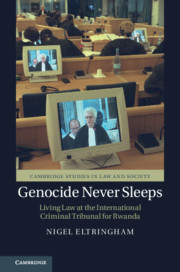 Nigel Eltringham. 2019. Genocide Never Sleeps: Living the Law at the International Criminal Tribunal for Rwanda. Cambridge
Nigel Eltringham. 2019. Genocide Never Sleeps: Living the Law at the International Criminal Tribunal for Rwanda. Cambridge
Accounts of international criminal courts have tended to consist of reflections on abstract legal texts, on judgements and trial transcripts. Genocide Never Sleeps, based on ethnographic research at the International Criminal Tribunal for Rwanda (ICTR), provides an alternative account, describing a messy, flawed human process in which legal practitioners faced with novel challenges sought to reconfigure long-standing habits and opinions while maintaining a commitment to ‘justice’. From the challenges of simultaneous translation to collaborating with colleagues from different legal traditions, legal practitioners were forced to scrutinise that which normally remains assumed in domestic law. By providing an account of this process, Genocide Never Sleeps not only provides a unique insight into the exceptional nature of the ad hoc, improvised ICTR and the day-to-day practice of international criminal justice, but also holds up for fresh inspection much that is naturalised and assumed in unexceptional, domestic legal processes.
J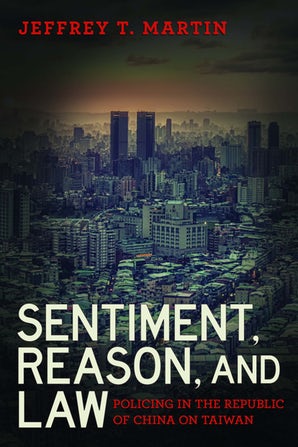 effrey T. Martin. 2019. Sentiment, Reason, and Law: Policing in the Republic of China on Taiwan. Cornell University Press
effrey T. Martin. 2019. Sentiment, Reason, and Law: Policing in the Republic of China on Taiwan. Cornell University Press
What if the job of police was to cultivate the political will of a community to live with itself (rather than enforce law, keep order, or fight crime)? In Sentiment, Reason, and Law, Jeffrey T. Martin describes a world where that is the case.
The Republic of China on Taiwan spent nearly four decades as a single-party state under dictatorial rule (1949–1987) before transitioning to liberal democracy. Here, Martin describes the social life of a neighborhood police station during the first rotation in executive power following the democratic transition. He shows an apparent paradox of how a strong democratic order was built on a foundation of weak police powers, and demonstrates how that was made possible by the continuity of an illiberal idea of policing. His conclusion from this paradox is that the purpose of the police was to cultivate the political will of the community rather than enforce laws and keep order.
As Sentiment, Reason, and Law shows, the police force in Taiwan exists as an “anthropological fact,” bringing an order of reality that is always, simultaneously and inseparably, meaningful and material. Martin unveils the power of this fact, demonstrating how the politics of sentiment that took shape under autocratic rule continued to operate in everyday policing in the early phase of the democratic transformation, even as a more democratic mode of public reason and the ultimate power of legal right were becoming more significant.
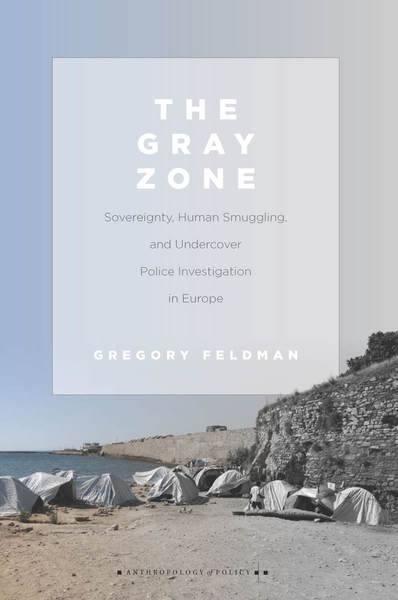 Gregory Feldman. 2020. The Gray Zone: Sovereignty, Human Smuggling, and Undercover Police Investigation in Europe. Standford University Press.
Gregory Feldman. 2020. The Gray Zone: Sovereignty, Human Smuggling, and Undercover Police Investigation in Europe. Standford University Press.
Based on rare, in-depth fieldwork among an undercover police investigative team working in a southern EU maritime state, Gregory Feldman examines how “taking action” against human smuggling rings requires the team to enter the “gray zone”, a space where legal and policy prescriptions do not hold. Feldman asks how this seven-member team makes ethical judgments when they secretly investigate smugglers, traffickers, migrants, lawyers, shopkeepers, and many others. He asks readers to consider that gray zones create opportunities both to degrade subjects of investigations and to take unnecessary risks for them. Moving in either direction largely depends upon bureaucratic conditions and team members’ willingness to see situations from a variety of perspectives. Feldman explores their personal experiences and daily work in order to crack open wider issues about sovereignty, action, ethics, and, ultimately, being human. Situated at the intersection of the EU migration apparatus and the global, clandestine networks it identifies as security threats, this book allows Feldman to outline an ethnographically-based theory of sovereign action.
Featured photo: Lady of Justice, photo (cropped) by edwardlich (Creative commons, CC BY-NC-SA 2.0)


